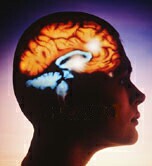MRI study suggests working memory doesn’t bounce back as quickly as it does in men
TUESDAY, April 28, 2015 (HealthDay News) — New research from Taiwan uncovers more evidence that women may have a more difficult time recovering their memory after concussions. The study appears online April 28 in Radiology.
The new study, which was led by Chi-Jen Chen, M.D., and conducted by scientists at the Taipei Medical University Shuang-Ho Hospital in New Taipei City, Taiwan, involved using functional magnetic resonance imaging scans to study the brains of 30 men and 30 women. Half of each group had suffered mild traumatic brain injuries (mTBIs) from playing sports, car crashes, falls, or assault. Their brains were scanned a month after their injuries and again after another six weeks had passed. The other halves of both groups had not suffered mTBIs.
In the first round of scans, the Taiwanese researchers found that the sections of the brain devoted to working memory were more active in brain-injured men and less active in brain-injured women, compared to their uninjured peers. The working memory in the brain-injured men, at least when viewed via brain scans, seemed to have returned to normal when they returned six weeks after their first scan. But the brains of the injured women were still affected.
“Female patients with mTBI had lower digit span scores than did female control subjects, and functional magnetic resonance imaging depicted sex differences in working memory functional activation; hypoactivation with nonrecovery of activation change at follow-up studies may suggest a worse working memory outcome in female patients with mTBI,” the authors conclude.
Full Text (subscription or payment may be required)
Copyright © 2015 HealthDay. All rights reserved.








